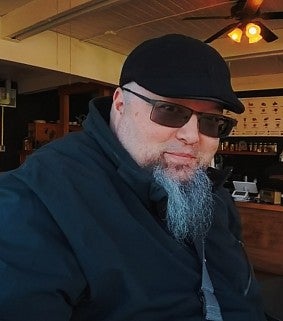What area do you work in within the VPFA portfolio?
Information Services - Information Security Office - Cyber Security Operations Center (CSOC)
What is your current position, and what are your job responsibilities?
I am the CyberSecurity Operations Center Manager. In this role, I oversee the day-to-day operations of the UO’s CyberSecurity Operations Center (CSOC), managing a team of nine Student Security Analysts and a full-time Threat Intelligence Analyst. As part of the Information Security Office, the CSOC’s operational responsibilities are focused on cybersecurity event monitoring, detection, assessment, and incident response for the university. We also participate in cybersecurity threat and risk management - including threat hunting, threat prevention, and vulnerability management.
I provide direction, ongoing training, and mentorship to our cadre of Student Security Analyst in support of these activities.
What has been your career path; how did you end up in your current position?
While attending the University of Oregon, for Political Science and Japanese language, I worked for the university as a student employee in several technical roles - among which I’ve worked in the EMU Computer Lab as a lab assistant, IT support for a College of Education unit, and as a consultant in Unix/VMS Consulting. Each position had progressively more challenges and opportunities for growth.
After graduation, I applied to and was accepted for the Acceptable Use Policy Officer position with the Academic User Services unit in the Computing Center. From there my cybersecurity role and responsibilities in the Computing Center/Information Services grew and morphed over time as the Information Security program at the university developed.
As Information Security at the university evolved, my career has progressed through several roles: Acceptable Use Policy Officer, Senior IT Policy and Security Administrator, Senior IT Security Analyst, and currently CyberSecurity Operations Center Manager.
What do you like about your current position?
The opportunity to act as mentor to the CSOC student security analysts, creating solutions to address the constantly changing cybersecurity landscape that the university and our community face, and building partnerships within the UO community to meet those challenges.
I also find the analytical challenge of security incident response particularly rewarding. It requires methodical investigation—piecing together clues and solving complex puzzles to uncover root causes—at times necessitating creative problem-solving to quickly identify and resolve threats.
Please share some insight into what your job involves.
A cybersecurity role in a university environment, with our extraordinarily diverse needs and technical ecosystem, requires versatile competence to navigate. There is a need to be a diplomat (working with individuals who may feel stifled by security controls), an educator (explaining threats to non-technical community members), a crisis manager (responding to and managing incidents; working late into the night), a bureaucrat (navigating university politics and processes), an engineer (building tools and solutions), and an analyst (understanding and responding to the continually shifting cyber threat landscape).
In a single week, it may be necessary to:
- Deploy cybersecurity systems to automate detection & response and write code to tie it all together.
- Explain to a professor the risk of having their lab equipment directly Internet-connected and work with them to mitigate the risk, while ensuring that they have what they need in order to be successful.
- Mentor student security analysts through their first malware incident
- Convince overworked IT staff that yes, we really do need to update a critical system during a much less than opportune time of the term
Share a little about yourself personally:
Born into a military family, I was lucky enough to live in a number of locations across the world, both in the US and overseas. I’ve lived in Germany, California, Japan, a small atoll in the middle of the Pacific, Hawaii, New Zealand, and Washington State. At this time I have called Oregon home for more years than I have not.
Fair warning - I have a doppelgänger roaming out there in the world. So if you happen to run across someone who appears to be me, but doesn’t recognize you, you will have met my twin.
If you could only take three items with you to a deserted island, what would they be?
Assuming a tropical locale - a multi-tool, a magnifying glass, and a good book.
How do you want to be remembered?
Over the many years at the university, I have had to be the bearer of unwelcome cybersecurity findings to faculty, staff, and students, but mostly IT staff. Bringing to them ill tidings of system vulnerability or compromise that derails their previously well-planned day or even week. I hope that I am remembered not as the harbinger of those dark times but rather as a partner who helped navigate them through challenges and emerge stronger, more secure on the other side.
(November 2025)

